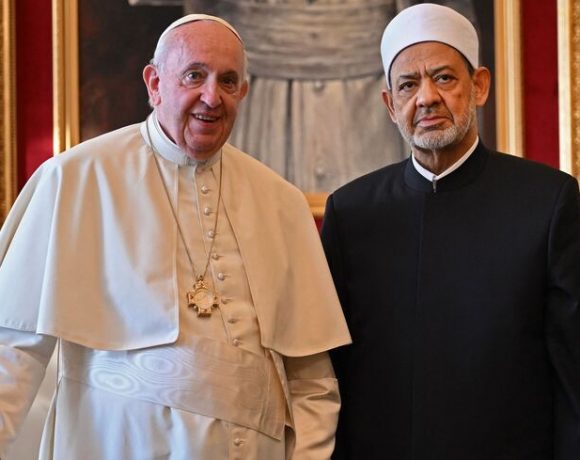
Pope Francis and Sheikh Ahmed al-Tayeb, grand imam of Al-Azhar, speak at a United Nations gathering about the need of “human fraternity.”
Pope Francis and a major Sunni imam both called for peace at the United Nations Security Council in New York, where the topic was “human fraternity.”
The pope, who is recuperating from abdominal surgery, addressed a message to the United Nations assembly on Wednesday, saying that a third world war is being fought “piecemeal” and that mankind is suffering from a “famine of fraternity.”
Sheikh Ahmed al-Tayeb, grand imam of Al-Azhar, Cairo’s 1,000-year-old seat of Sunni learning, stated in a virtual briefing to the UN Security Council that human brotherhood was the key to world peace, a message he and Pope Francis emphasised in a joint paper issued in 2019.
“In our day, with nuclear weapons and weapons of mass destruction, the battlefield has become practically unlimited, with potentially catastrophic consequences,” the pope said in a statement read by Archbishop Paul Richard Gallagher, the Vatican’s secretary for relations with states and international organisations.
“The time has come to say an emphatic “no” to war, to declare that wars are not just, but only peace is just,” the pontiff said in a statement.
Without identifying Russia or Ukraine, the grand imam stated that the war raging on Europe’s eastern frontiers has instilled anxiety and “concern that it may regress humanity to a primitive era.”
“Our gathering today is not a luxury, but a necessity, dictated by concern for the future of humanity,” al-Tayeb stated.
According to the grand imam, political leaders must pursue the goal embraced by Al-Azhar and the Roman Catholic Church in the 2019 manifesto on human brotherhood for world peace.
Following the pope’s and grand imam’s pleas, as well as council addresses, members endorsed a resolution acknowledging that hate speech, racism, xenophobia, intolerance, gender discrimination, and acts of extremism “can contribute to the outbreak, escalation, and recurrence of conflict.”
The resolution, co-sponsored by the UAE and the United Kingdom, was unanimously accepted, despite the fact that several of the council’s 15 members had been accused of some of the same crimes they denounced.
After the voting, UAE Ambassador Lana Nusseibeh told The Associated Press that it was a “landmark” resolution that brought together prior council decisions tackling hate speech, racism, incitement, and extremism in various ways for the first time.
According to Nusseibeh, it fosters tolerance, equality, cohabitation, and conversation.
UN Secretary-General Antonio Guterres hailed the pope and grand imam’s proclamation as “a model for compassion and human solidarity,” urging governments and people throughout the world to “stand together as one human family” and create “an alliance of peace, rooted in the values of human fraternity.”
Picture Courtesy: Google/images are subject to copyright
